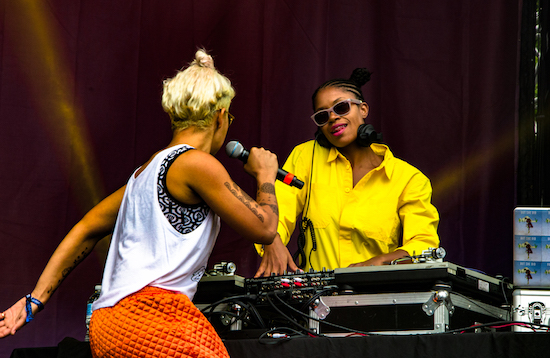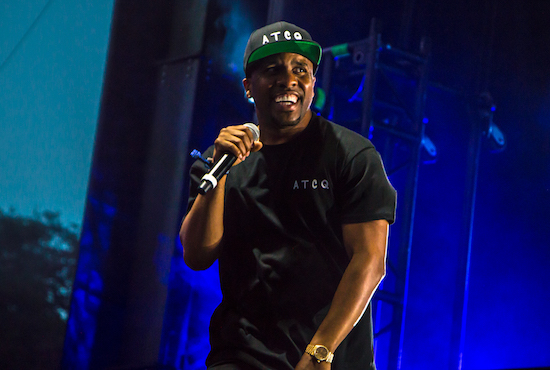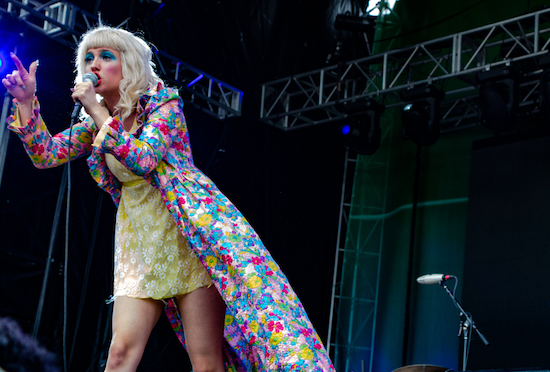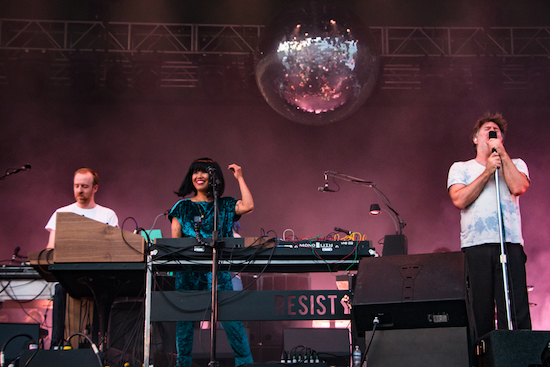All photos: Lior Phillips
Colin Stetson has more lungs than you
Five minutes in, my bubbling brain dives in with the high-volume plunge of Stetson’s bulging saxophone tone, as he summons the howling crunch of a thousand cracked ribs ciphering through a metal sieve. Not to toot his own horn, but I wonder if Colin Stetson will part with one of his lungs? I have asthma, you see, and his lung capacity seems strong enough to power the both of us (and probably the entire city if we had the guts to plug humans into generators). The muscular American multi-instrumentalist oscillates from bass saxophone to alto and back, producing soaring anthems like ‘Judges’ and ‘Between Water and Wind’ via circular breathing, interlocking woodwind tones and moaning vocals. I am well aware that his music conjures swarms of whirling intensity, but it’s an all-time record to already be crying at 2pm. What’s more, the tears are produced by the loud clacking of saxophone keys and low groans – on his new song ‘The Love it Takes To Leave You’. The festival’s mammoth video screens are perfect for Stetson’s set: his rhythmically swaying visage is treated to soft-wash layers of video delay, the visual equivalent of those interlocking versions of Stetson produces at a single moment.
Solange is a Solangenius
A warning label – like the ridiculous disclaimer on the back of a bottle of peppers-from-hell-hot sauce – should be plastered on the gates of the festival come Sunday: “For fans of LIFE, LIVING and the INTENSE. A natural HIGH!” Solange slices elements from a dozen exciting, enticing styles including R&B, free jazz, pop and funk, and moulds them into seamless illusions. Her live show is as urgent as it is magnetic: she is practically ablaze. The hum in the air on Sunday starts early, the crowd a little more on edge, a little less drunk, a little more eager, a little younger, a little bouncier. For all the energy of A Tribe Called Quest the previous night, Solange provides all of the star power but replaces the nostalgia portion of their equation with a vibrant presence. By the time she takes the stage, the field is packed with fans, their screams piercing the air and picked up on the mics louder than perhaps any of the singers up to that point at the festival. Then Solange’s rich, resonant voice tops even the teeming fans. The choreographer, composer, conductor and star of the set, Solange is a powerful force of clarity and strength, but also fragility. “It ain’t always pretty, actin’ a fool in public and shit,” she smiles. “But I thank you so much for allowing me to live in my truth.”
Seeing LCD and Tribe is a thrill for thousands, a rekindling of past passions or the opportunity to see a band loved for years with no dream of being able to see them. But it is clear that Solange’s set is one of those supernatural sacred experiences. There are uncontrollable shouts, singalongs, tears and a helluva lot of dancing. In a weekend that seems to actively appeal to and empower women of colour, closing with songs like ‘Cranes in the Sky’, ‘F.U.B.U.’, ‘Losing You’, and ‘Don’t Touch My Hair’ is the perfect cap. That’s not to say the set is in any way limited in its appeal: the Union Park field is one giant sea of moving, grooving people, all together. It is a moment where you might want to press pause, just to wonder about your life, but the surging symphony of music demands you keep moving forward.
The future is goddamn female and strong
Both Madame Gandhi and Dawn Richard’s sets, early on the first day of Pitchfork Music Festival, brim with inspiring messages for women and people of colour, but it’d be unfair to sum them up by that one fact. They prove their potential as pop-dominating forces by the extreme diversity of things they excel at. Kiran Gandhi may be best known for her time as drummer for MIA but, off the back of mesmeric sets like this one, that will inevitably change. The magnetic performer bounces across the stage, leading her group of yellow-jumpsuit-clad musicians and dancers, offering feminist critiques over wordless vocal loops, singing choruses of empowerment and commanding the stage over intense polyrhythmic beats. While her band opt for yellow (“I always grew up wearing yellow – sometimes with all the oppression in the world, we have to do things that make us feel good”), Gandhi herself wears orange, as part of Wear Orange – the festival’s partnership with Everytown for Gun Safety and Mothers Against Senseless Killing, aiming to curb gun violence in Chicago. Every element of Gandhi’s set speaks loudly in support of the oppressed and those in need.
Richard, meanwhile, aims to do the same by spreading love – both self-love and of others. “I didn’t expect this many people,” she beams. “I feel really good about myself!” That kind of line could come off as a brag, but it feels genuine and pure, Richard and the crowd overwhelmed by the pure concentrated love and joy pouring from her speakers. Songs like ‘Not Above That’ and ‘Faith’ keep her dancers moving on dazzling silver high heels, and the crowd follow suit. When songs lunge forward, stage-jiggling percussion rips beneath a glistening riff before the whole band manoeuvres into a double-time race to the finish line, where booming vocals intensify the natural nerves of the rhythm section. “Shout out to my hearts here today,” she smiles. Looking across Pitchfork on Friday afternoon, there are plenty of proud, bright, beating hearts to be found.

The beat goes on
In a weekend full of flailing feet, semi-coordinated hip-jangling and shimmying shoulders, there doesn’t seem much need to call out any particular act for their grooving beats – rather it would be best to showcase two extremes of the spectrum. On one end is Derrick Carter, one of the innovators at the forefront of Chicago’s house scene of the late 80s. His hypnotic set mixes clippings of Aaron Neville’s ‘Hercules’, Kid Enigma’s ‘Dangerous’, Blaze’s ‘My Beat’ and much, much more, always tied together with that thumping Chicago house bass. The legend masterfully pushes and pulls at the beat, keeping the BPM at just the right place to keep us transfixed like a swarm of the living dead. At the other end of the spectrum is Nicolas Jaar. The Chilean-American producer’s take is much more experimental, weaving in and out of familiarity and intense ethereality. His tones are far darker than Carter’s, loaded with bass clarinet, his own murky vocals and even a blaring scream, though no less dance-friendly. Both exist in a space of unyielding phosphorescent textures, summoning a captivating level of ambiguity and influence.
It’s possible to laugh through the back pain
When interlocking their rhythms, weaving synthesizers together and fitting their voices into multi-part harmony, LCD Soundsystem’s headline set shows no sign of rust – just full-sprint passion and energy for new songs and longtime favourites alike. But in those moments when the giant disco ball lights aren’t spilling across the thousands singing along, James Murphy and his bandmates begin to show their long-tenured reality. There are complaints of bad backs, plenty of glasses of white wine (a Mark Angeli La Lune, Murphy declares, in case you want to drink like LCD), and talk of how long it’s been since they’ve been to Chicago. But even if they’ve aged, it’s been graceful and happy; I last saw LCD Soundsystem at last summer’s Primavera and Roskilde festivals, and they seem even happier to be together now, Murphy laughing and smiling throughout most of the set. His fingers grip the creases of his T-shirt, as if holding on from the force of the laughter. Thousands of giddy voices match their joy second-for-second, singing along to every chorus and instrumental squiggle; LCD are a salve for when the night doesn’t quite seem finished, and the party feels unavoidable. Their live show still enables an emotional accessibility that is rare. Sprawled pieces unfold into sculpted soundtracks, the kind you want to crawl into and live in for a while. If you close your eyes, many of these interconnected pieces evoke surrealistic states where thoughts seem flexible and the world around you seems a lot kinder.

Now that’s what I call a fucking headliner
Can they kick it? Yes they can! A Tribe Called Quest manage to top even the loftiest expectations: with plenty of raucous energy, raw emotion, and serious fun. Together with LCD Soundsystem and Solange, Pitchfork have booked three headlining acts capable of scraping every last bit of energy off the field and sending crowds soaring into the sky. In touching tribute to Phife Dawg, their tragically passed compatriot, the surviving members of Tribe leave a microphone stand on stage, lit frequently by a spotlight as the rapper’s voice pulses through the speakers – though the massive, dancing crowd likely could supply every single word just as loudly. “This is our first performance without Phife. We’re trying to get through it, but we appreciate the energy very much,” Q-Tip notes halfway through the set, his voice cracking ever so slightly.
But this is certainly a lot more than a memorial show. Whether dropping a track from their 2016 return like the bombastic ‘Dis Generation’, a brief cover of Busta Rhymes in ‘Woo Hah!! Got You All in Check’, or digging back for songs like ‘Buggin’ Out’ from 1991’s Low End Theory, Tribe push all the right buttons to bring a triumphant, massive headlining set with barely room for a breath – including Q-Tip’s breathless beatboxing. “Lost – art – nobody – does this – anymore – I’m really – showing – my age,” he spits, punctuated by some bassy, percussive mouth sounds. Q-Tip, Jarobi White, and Ali Shaheed Muhammad manage to be massive and intimate, rowdy and tender, nostalgic and present, all at the same time. And the one-two punch of ‘Bonita Applebum’ and ‘Can I Kick It?’ doesn’t hurt either.
The perfect antidote to the work week
While some are able to get out of work on Friday afternoon for the 1pm start, others are stuck in the 9 to 5, perhaps sneaking a bit of the livestream in on their computers. But even those unlucky souls are able to kick the weekend off right, thanks to a 6pm performance from Danny Brown. The eccentric, ebullient rap star’s constant tongue-waggling, joke-cracking, cartoonish delivery is a pick-me-up needed for the second wave of attendees who have been counting down the hours in their cubicles.

Forget Sunday, the best time to see Priests is Friday
Punk rock that will slap you in the face, throw you out an open window and hug you all at the same time. Music you want to fight and fuck to. Priests inject a boundless energy too hard to ignore. Must see live, it’ll feel like a confessional.
Legends live
A Tribe Called Quest are the legends at the very top of the lineup on the second day of Pitchfork, but others do their fair share of stunning work, each in their own unique lanes. PJ Harvey’s regal protest, The Feelies’ proto-college rock, and George Clinton and Parliament-Funkadelic’s ecstatic funk party all more than justify the massive crowds, dropping a sense of awe into the mix.
Pitchfork packs a diverse punch
Niche festivals don’t typically keep diversity in mind, for practical or geographical reasons. Though it only takes five minutes to walk Chicago’s Union Park from end to end, this festival feels remarkably diverse – in genres, eras and attendees. From Kamaiyah’s throwback rap to Mitski’s heart-wrenching indie rock and Jamila Woods’ soulful R&B, there is truly something for everyone. Considering the fractured state of the world, it’s nice to see everyone sharing a park.


